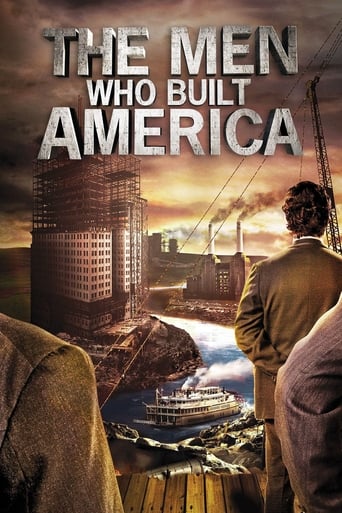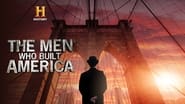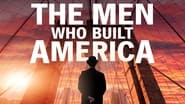KLS8800
I home-school my daughter and used this series to expand on this era of time in American History.Traditional schools just touch on these men. I wanted her to get the idea of who they really were, how driven they were and how visionary they had to be to achieve such greatness.Now that we are done with the series, we both feel more informed, and we will miss The Men Who Built America in both spirit and history.Side note: Great acting by all in the series, they brought their roles to life and gave them personality and depth.
sleepyhat
A big disclaimer missing from this film, that is "Based on true events". It gives wrong impression to audiences who are familiar with the history of the underlying intent for inserting erroneous info. Is it just bad info? Or is there an alternate motive to feed wrong info to audiences not intimate with history judging from the remarks made by the modern influential men?Since this film was distributed via History Channel, the inaccurate info take away 5 points. If it was simply someone's attempt to make drama based on true events, this score would have been higher.This film cannot even be regarded as historical documentary. At best, a recount of PERSONAL perspectives, understanding and ideals of some history. It would probably be more enjoyable if it tried to learn from Elon Musk version of MARS TV show.However, if the intent is to spread personal view, belief and agenda into audiences who don't care much about history, this may be the piece to create alternate reality for them.
gkeith_1
I have a history degree. My favorite period is the Gilded Age/Progressive Era, and these men fell into that category. Too bad there are no women.Slams: just a small part of the backlash against these "great"men is shown. There were strikes and depressions. Some of those have been covered. These super rich men "ate cake" (named after a famous woman) while their employees starved or were forced to work ungodly schedules in the man-killing factories.The Johnstown flood show depicted a lot of devastation and human heartbreak. Meanwhile, the biggies just went on partying.I wondered why the Andrew Carnegie name on lots of our libraries. Turns out he was trying to assuage all his cruelty against society, e.g. his "robber-baron-ness".I do think the actor who played Andrew is very handsome, and the one who portrayed JP Morgan is fairly good looking also. Vanderbilt looked kind of gross. Frick was the incarnate monster. I am glad the guy beat him up. Too bad Frick did not meet his maker.Morgan Sr. was an old scrooge, but posthumously proved to be correct in his financial predictions. He said Pierpoint was pretty dumb to back electric light.Westinghouse was depicted as a moron. Edison IRL was known for some shady deals, one of which was trying to get credit for the invention of the telephone away from Alexander Graham Bell.Edison was also friends with Harvey Firestone and Henry Ford. Will that be covered her? Just saw a GE commercial on TV last night, remembering in this show how Morgan got Edison to give up his name in favor of General Electric Company.This series is more about the financiers than the famous inventors. It takes money to fund people's imaginings and wildest dreams. Sometimes the dream financing is a true bust, but without dreamers where would we be today? Too bad the dreamers and financiers were not always the same person.Turns out the Gilded Age means a layer of fake gold on the outside, masking nothingness on the inside. Supposedly these great men came from nowhere, determined to make it in the great nation of capitalism and post-Civil War optimism. Were they educated? When the money was pulled out from under them, they tended to collapse.
Bob H Hitlan
History that in no way challenges any of the accepted conceits of 2012. Which really is a shame. Decent popular history should show us that those ideas we always took for granted as to how and why thing happened in the past are very likely quite wrong. And what if the conventional wisdom is correct? Well, it really never is- conventional wisdom is the result of popular misconceptions and other filters, real history is always more nuanced and complicated than even well written history, let alone popular convention.Good popular history challenges our preconceptions. Instead, in the case of "The Men who Built America" we get a one dimensional reality; The story of the men who, while helping to build the country, created a series of evil empires that were finally brought down once and for all, and for the good of the common man, by the efforts of certain politicians. Fair enough. A good start. But when you are given a couple hours for each of five American icons, it would be better if the producers could have shown us how much of the reality went against the narrative presented here.Instead of presenting the public opprobrium against Standard Oil as springing solely from Rockefeller's sins against the working people, it would have been more accurate to show that the victims were seen as the small, independent businessman, not the worker who was treated as badly under them as under Rockefeller. In fact, I may have missed it, but how can one show the story of Rockefeller without a mention of Ida Tarbell? The story of Morgan seemed to be more than a bit off in the attempt by the writers to neatly shoehorn JP Morgan into the rest of the narrative. I am sure that his life was intertwined with the industrialists in many ways, but I think that Morgan and his ilk stood somewhat apart from the industrialists, keeping his people on their boards only to safeguard the investments that were made. Morgan and how he made money, was nearly entirely separate from the industrialists and is interesting in its own right.All in all, its a pretty fair show, given the typical History channel fare. At least its not Ancient Aliens. And accurate enough, I guess, except for the section on Morgan which I think badly distorted how he really was important to our history. But in giving us the most bland, vanilla version of the events it was another wasted opportunity by the History Channel.






